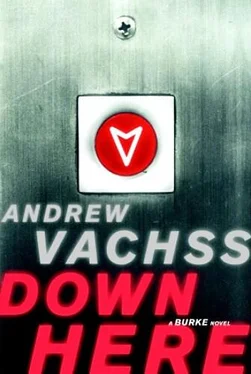“Strategy?”
“Not exactly. I mean, I already sold it. The book, that is. I’m talking about my idea for it. I know it’s perfect. But if I can’t bring it off, the book will still happen, but it won’t be as good as if—”
“That’s one idea,” she said. “I was talking more about . . . models.”
“Models?”
“Ways of doing things. Ones you develop over time, testing and retesting . . .”
“Like a system for picking winners at the racetrack?”
“A little more sophisticated than that, I hope,” she said, chuckling. “And a little more successful, too. None of those ‘systems’ really work, do they?”
“I never heard of one that did,” I told her, pure truth.
“Here we go,” she said. “You know the Maurice Avenue switch-off?”
“Sure,” I said. “I once worked as a cab driver. To get perspective for a piece I was doing.”
“Okay, now just follow it around until we get to Sixty-first.”
“That’s Maspeth, right?”
“Yes, it is. Not many people from the City know that.”
“That’s one of the things about having a car,” I said. “You go places where the subway doesn’t.”
“I have a car, too, remember? Turn . . . there! Yes. Now just go along until I tell you to turn again.”
“You like that Audi?” I asked her.
“Oh, yes,” she said. “Whoever did the interior-design work on it was a genius.”
“Is it pretty quick?”
“It has a turbocharger,” she said, almost smugly. “I got a ticket when I went upstate for a ski weekend once. The officer said he clocked me at a hundred and ten. But he only wrote me up for eighty-five.”
“If it had been me, he would have written me up for a hundred twenty.”
“Because your car is so fast, you mean?”
“No. Because I’m about the polar opposite of a pretty girl.”
“That’s cynical,” she said, grinning to show me she didn’t really think so.
I followed her directions for a few minutes, watching the densely packed little houses give way to flatland.
“There!” she said.
“Where? That’s not a restaurant. It looks like—”
“An old factory?” she said, pleased with herself. “That’s what it was, once. Now it’s condos. And one of them is mine.”
“Okay, I get it. You want to change out of your work clothes before we—?”
“I do want to change,” she said. “But I also want to cook. Okay?”
“Beautiful,” I said.
“ What did this place use to make?” I asked her, following her directions to drive around to the back.
“Some kind of containers, I think. Metal. As I understand, the conversion to plastic would have been too expensive. And the work wasn’t there anymore, anyway.”
“This is pretty neat,” I said, looking at a vertical steel-barred fence with an inset gate.
“Use this,” she said, handing me a credit-card-sized piece of plastic.
I inserted the card in the slot, and the gate swung open. We were facing a four-story building that looked like poured concrete, painted the color of cigarette smoke. Laura reached in her purse, pulled out a remote garage-door opener. She pressed the button; a triple-wide steel door rolled up soundlessly as the gate closed behind us.
Inside, there were individual spaces for parking, enough for thirty or so cars.
“Use number seven,” she said. “It’s mine.”
I backed the Plymouth in carefully—the car in stall number six was her silver Audi.
“That’s slick,” I said. “You own the space on the other side of it, too?”
“Actually, I do. But I don’t just own the parking spaces; they come with the units upstairs. So I have six slots; you get two with each apartment.”
“You own three apartments?” I asked, cutting the ignition with the car in gear so the engine wouldn’t diesel on me—big-block Mopars will do that sometimes.
“Me and the bank,” she said, flashing a quick grin.
We got out, me extra-carefully, so that the Plymouth’s door wouldn’t ding her Audi.
“You don’t have to worry,” she said, standing by the front fender. “There’s a lot of space between the slots. This used to be the loading bay for the factory. Even with two slots per unit, we have a ton of space left over. See that?” she said, pointing to a chain-linked enclosure to my right.
“Yeah.”
“That’s for storage. Every unit-holder gets a certain amount of space in there, too. You supply your own lock.”
“Damn! Something like that in Manhattan would set you back a—”
“If you think this is a bargain, wait till you see upstairs,” she said.
“ There’s an elevator,” she said. “But I always walk. Sometimes, it’s the only exercise I get all day. Do you mind?”
Without waiting for an answer, she unlocked the stairway door and started up ahead of me. Halfway up the first flight, I realized Michelle had read Laura Reinhardt better secondhand than I had in person; if she was suffering from secretarial spread, I couldn’t see a hint of it.
Her unit was on the top floor. Two locks, deadbolt and doorknob. She stepped inside, flicked on a light, said, “Well?”
The apartment opened directly into a broad expanse of hardwood floor, bleached so deeply it was almost white. The side wall was exposed brick, beautifully repointed. At the end of the room was a corner-to-corner set of pale-pink drapes. She hit a switch and the drapes parted, revealing a floor-to-ceiling glass wall.
“Jesus!” I said.
I wasn’t acting. The wall opposite the exposed brick was a complex arrangement of brass piping, holding what looked like teak shelves. Hardcover books with somber jackets alternated with framed photographs and an assortment of small objects I couldn’t make out from where I was standing. Modernistic furniture was scattered about as if at random, but it looked so . . . tailored that I figured it for a professional’s touch.
“Come on,” she said, “I’ll give you the quick tour.”
I followed her into a kitchen that I knew the average yuppie would commit several felonies for. A stainless-steel refrigerator-freezer lorded it over a granite-block island and a black porcelain double sink. The cabinets looked like they had been fashioned from the same teak as the bookshelves. The stove didn’t appear to have any burners on it. A chrome table sat off to one side, with eight matching chairs. An eat-in kitchen, big enough to hold Thanksgiving dinner.
Before I could ask about that, she was on the move again.
“My office,” she said, pointing to a spacious room with a window facing the same direction as the one in the living room. It looked like high-tech heaven, mostly in carbon-fiber black. A flat-screen computer monitor; a multi-line phone with both wired and cordless handsets; one of those fax-photocopier-scanner things. Under a desk with a black marble top, a large paper-shredder—my money was on cross-cut.
“There’s more,” she said, pulling me by the hand.
We passed a blue-tiled bathroom, a bedroom—“It’s really a guest room,” she said—and then came to a room dominated by a big-screen TV and a single white leather recliner. “If I were a man, I’d probably claim this was a den,” she chuckled.
The master bedroom was a good three hundred square feet, with plenty of room for the queen-sized bed with a Mondrian-pattern headboard, and a garage-sized closet. The attached bath had a two-person Jacuzzi, and it didn’t cramp the area. One wall was a triptych of mirrors.
“How big do you think the whole thing is?” she asked, walking back toward the living room.
“Twenty-five hundred?” I guessed.
“Closer to thirty -five,” she said. “See what I mean about a bargain?”
Читать дальше











